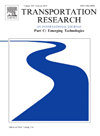The focus of Transportation Research: Part C is high-quality, scholarly research that addresses development, application and implications, in the field of transportation, of emerging technologies from such fields as engineering, computer science, electronics, control systems and telecommunications, among others. The interest is not in the individual technologies per se, but in the ultimate implications of emerging technologies for the planning, design, operation, control, management, maintenance and rehabilitation of transportation systems, services and components. Also of interest are the impacts of emerging technologies on transportation system performance, in terms of level of service, capacity, safety, reliability, resource consumption and the environment, economics and finance, privacy, standards, liability, and societal and institutional roles and barriers. Submissions in the following areas of transportation are encouraged by Part C: emerging technologies for all modes; intelligent transportation systems; adaptive control and real-time operations; sensors and detection systems; infrastructure applications of emerging technologies.Part C's aims and scope are complementary to Transportation Research Part A: Policy and Practice, Part B: Methodological and Part D: Transport and Environment. The complete set forms the most cohesive and comprehensive reference of current research in transportation science. Selected abstracts from Transportation Research Part C: Emerging Technologies are available in TR Update, the Elsevier Science transportation newsletter. Call for Papers The Journal of Transportation Research Part C: Emerging Technologies is calling for papers for a Special Issue on Intelligent Agents in Traffic and Transportation, to be published in summer 2001. The guest editor for this issue is Ralf Schleiffer at the German Aerospace Center and at the Technical University of Aachen. The journal welcomes submission of original, high quality research papers, case studies, practitioners reports and invites manuscripts in all areas of Intelligent Agents in Traffic and Transportation. Relevant topics include but are not limited to: - microscopic modeling of heterogeneous decision making processes and of behavioral strategies (based on e.g. level of wealth, travel costs, environmental concern, learning processes) - route choice and mode choice problems modeled or solved by incorporating agent technology - intelligent traffic management supported by agents - data collection, filtering and information distribution maintained by agents - logistic chains such as supply chains or flight paths via hubs developed or supervised by intelligent agents - evaluation of the influence of incentives like car pooling or alternative work arrangements performed by simulating a society of agents All articles
